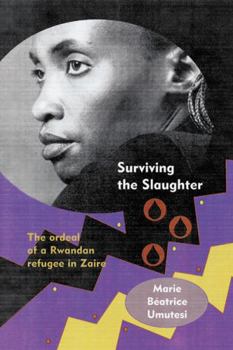Surviving the Slaughter: The Ordeal of a Rwandan Refugee in Zaire
Select Format
Select Condition 
Book Overview
In An Uncompromising Generation, Michael Wildt follows the journey of a strikingly homogenous group of young academics--who came from the educated, bourgeois stratum of society--as they started to identify with the Nazi concept of Volksgemeinschaft, which labeled Jews as enemies of the people and justified their murder.
Wildt's study traces the intellectual evolution of key members of the Reich Security Main Office (RSHA) from their...
Format:Paperback
Language:English
ISBN:0299204944
ISBN13:9780299204945
Release Date:October 2004
Publisher:University of Wisconsin Press
Length:284 Pages
Weight:0.90 lbs.
Dimensions:0.6" x 6.1" x 8.9"
Customer Reviews
3 ratings
A Tale of Disposable People
Published by Thriftbooks.com User , 20 years ago
I love this book but I am sickened by its content. I'm willing to bet that few people reading "Surviving the Slaughter" have ever had a bad year that adds up to just one day of Marie Beatrice Umutesi's many bad days depicted in this memoir. This is the story of the incredible hardship and endless courage and stamina of a lone woman who, miraculously, lived to tell her tale. Why didn't we in the USA know more about this genocide? In New York City I am surrounded by the "survivors" of the WTC attack on 9/11/01 and constantly assaulted by their self-serving weeping and wailing. If one half the population of New York City had died on 9/11/01 the numbers would begin to equal the slaughter of this one genocide in Rwanda. Reading this book definitely gives the reader a context within which to judge the relative impact and importance of current events. Having read my share of translations I must tip my hat to Julia Emerson for bringing this memoir to the attention of the English speaking world by making such a clear, readable and intelligent translation.
And this was before AIDS
Published by Thriftbooks.com User , 20 years ago
At one time an African nation composed of two large tribes has a slaughter, a genocide. The people in power, let's call them Tribe 1, decided to eliminate the Tribe 2. A few years later Tribe 2 has gained power so began the slaughter/genocide of Tribe 1. In this book Tribe 1 is the Huto, Tribe 2 is the Tutsi. Unfortunately this is a story so often repeated that the names almost do not matter. This could have been any of a number of countries. And the countries do not have to be in Africa. We had the Holocaust in Germany, Ethnic Clensing in what was left of Yugoslavia. We've had people seemingly going nuts as they did in China's Cultural Revolution. And then there are places like Israel, Northern Ireland and oh so many more. The story though keeps coming back to Africa. Taking place in the mid 1990's, this is a story of Africa, its leadership, such as it is. And it's a story of Africa before AIDS. The story in this book is a story of the survival of a Huto woman at the hands of the Tutsi. It's a story of struggle against terrible odds -- and she made it.
A story of incredible courage and humanity
Published by Thriftbooks.com User , 20 years ago
This is the tragic and triumphant autobiography of a Rwandan Hutu woman who, after living for a couple of years as an internally displaced person in Rwanda and then surviving the horrific conditions in the camps that were - illegally - set up in by the UN in Zaire within shelling distance of the Rwandan border and further down the road in the death camp at Tingi Tingi, decided, along with tens of thousands of others to try to escape from the murderous attacks of Kagame's RPF, UN bounty hunters and Kabila's troops by taking to the roads in an effort to find a way out of the country. She took around ten children, none of them her own, with her and tried, mostly unsuccessfully, to keep them alive during months of trekking through trackless tropical forests during the rainy season, walking barefoot on blistering roads, eating whatever they could scavenge in the deserted villages along the way. We have heard a lot about the tragedy of the Tutsi genocide in 1994. What we haven't heard, partly because the press has been manipulated by the current Tutsi regime in Rwanda and partly because the U. S. continues to count on Kagame to keep our access open to the minerals in Congo - particularly coltan, which is used in cell phones and computers - is that as many Hutu as Tutsi have been killed both before and after 1994. Books like "We Wish to Inform You that Tomorrow We Will Be Killed With Our Families" by Philip Gourevitch were highly misleading and only served to reinforce the mistaken view that all Hutu were genocidal and all Tutsi innocent victims, and as a result the world has let at least 750,000 innocent Hutu be slaughtered while their killers enjoy impunity. And that is not even counting the 3,000,000 Congolese who have died. The first chapters of the book give an overview of the history Rwanda and life in the camps, and the rest of it deals with Umutesi's trek across Zaire. It is even handed, understated, immensely powerful and very timely. It was published in French, Spanish, Catalan and Dutch before being translated into English.





